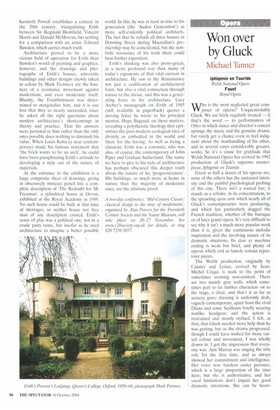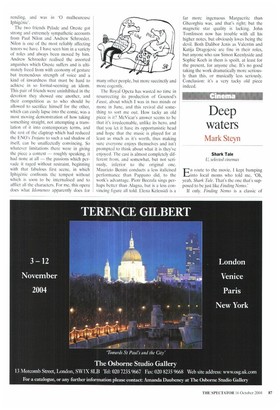Won over by Gluck
Michael Tanner
lphlgenie en Tauride Welsh National Opera Faust Royal Opera Who is the most neglected great composer of operas? Unquestionably Gluck. We are fairly regularly treated — if that's the word — to performances of Orfeo in which dance and director's conceit upstage the music and the genuine drama, but rarely get a chance even to feel indignant about the manhandling of his other, and in several cases considerably greater, works. So it's a cause for gratitude that Welsh National Opera has revived its 1992 production of Gluck's supreme masterpiece, Iphigenie en Tautide.
Great as half a dozen of his operas are, none of the others has the sustained intensity and the painful psychological probing of this one. There isn't a wasted bar; it stands as a rebuke, in its concentration, to the sprawling opere serie which nearly all of Gluck's contemporaries were producing, and which has particularly dogged the French tradition, whether of the baroque or of later grand opera. It's very difficult to see why it isn't a much more popular work than it is, given the continuous melodic inspiration and the involving nature of its dramatic situations. Its dens ex machina ending is weak but brief, and plenty of operas which end as lamely remain repertoire pieces.
The Welsh production, originally by Caurier and Leiser, revived by JeanMichel Criqui, is stark to the point of sometimes seeming non-existent. There arc two mainly grey walls, which sometimes part to let further characters on to the stage, a chair, and that's it as far as scenery goes; dressing is uniformly drab, vaguely contemporary, apart from the vivid Diana and some Scythians briefly wearing warlike headgear; and the action is restrained and mostly stylised. I felt, at first, that Gluck needed more help than he was getting, but as the drama progressed, though I could have wished for more varied colour and movement, I was wholly drawn in. I got the impression that everyone was. Ann Murray was singing the title role for the first time, and as always showed her commitment and intelligence. Her voice now hardens under pressure, which is a large proportion of the time here; but she is authoritative, and her vocal limitations don't impair her good dramatic intentions. She can be heart
rending, and was in '0 malheureuse lphigenie'.
The two friends Pylade and Oreste got strong and extremely sympathetic accounts from Paul Nilon and Andrew Schroeder. Nilon is one of the most reliably affecting tenors we have. I have seen him in a variety of roles and always been moved by him. Andrew Schroeder realised the assorted anguishes which Oreste suffers and is ultimately freed from with economy of gesture but tremendous strength of voice and a kind of inwardness that must be hard to achieve in so formal-seeming an idiom. This pair of friends were uninhibited in the devotion they showed one another, and their competition as to who should be allowed to sacrifice himself for the other, which can easily lapse into the comic, was a most moving demonstration of how taking something straight, not attempting a translation of it into contemporary terms, and the rest of the claptrap which had reduced the ENO's Trojans to such a sad shadow of itself, can be unaffectedly convincing. So whatever limitations there were in giving the piece a context — roughly speaking, it had none at all — the passions which pervade it raged without restraint, beginning with that fabulous first scene, in which lphigenie confronts the tempest without which is soon to be internalised and to afflict all the characters. For me, this opera does what Idomeneo apparently does for many other people, but more succinctly and more cogently.
The Royal Opera has wasted no time in resurrecting its production of Gounod's Faust, about which I was in two minds or more in June, and this revival did something to sort me out. How tacky an old piece is it? McVicar's answer seems to be that it's irredeemable, unlike its hero, and that you let it have its opportunistic head and hope that the music is played for at least as much as it's worth, thus making sure everyone enjoys themselves and isn't prompted to think about what it is they've enjoyed. The cast is almost completely different from, and somewhat, but not seriously, inferior to the original one. Maurizio Benini conducts a less italicised performance than Pappano did, to the work's advantage. Piotr Beczala sings perhaps better than AJagna, but is a less convincing figure all told. Elena Kelessidi is a far more ingenuous Marguerite than Gheorghiu was, and that's right; but the magnetic star quality is lacking. John Tomlinson now has trouble with all his higher notes, but obviously loves being the devil. Both Dalibor Jenis as Valentin and Katija Dragojevic are fine in their roles, but anyone who saw Simon Keenlyside and Sophie Koch in them is spoilt, at least for the present, for anyone else. It's no good taking the work dramatically more seriously than this, or musically less seriously. Conclusion: it's a very tacky old piece indeed.











































































































 Previous page
Previous page